Symposium IP and Industry 4.0: IP leaders discuss the challenges of protecting digital business models
At the beginning of the day, the questions in the room were “Is anything new with Industry 4.0 and IP?” and “Is it possible to protect anything at all in digital business models?”. At the end of the conference, the last panel discussion summed up the overall result: “Without IP protection, digital business models make no sense at all”.
It became clear in the intensive discussions that a lot is changing for classic patent work. The challenges are enormous not only for medium-sized companies, but also for departments with considerable resources.
More than 50 IP professionals from the German industry from Siemens, Bosch, BASF, Schott, Trumpf, Heidelberger Druckmaschinen, Elmos Semiconductor, Osram, Stihl, Dürr, Merz Pharma, Hoffmann-La Roche, Erich Netzsch, Diehl, fm, Wago, Festo, Roche, Covestro, MAN, Clariant, Felix Schoeller, Kuka, ThyssenKrupp, Voith and Audi met on November 14th at the Forum Institut in Heidelberg to discuss the challenges of digitalization, especially in industrial business models, under the motto “IP and Industry 4.0” and to share their experiences.
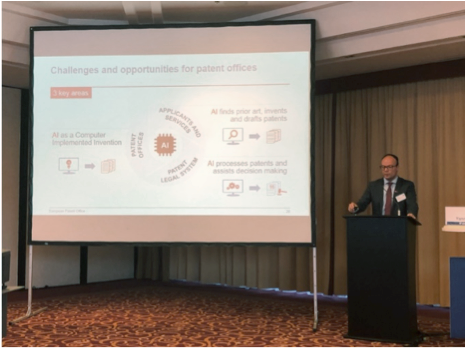 The keynote speech “Digitization trends – The experience and expertise of the European Patent Office” was given by Yann Ménière, Chief Economist of the European Patent Office. He emphasized the EPO’s stable granting practice of approx. 16% for software patents or patents with a specific reference to business methods since 2001. The grant rate is relatively low compared to the large patent offices in the USA, Japan or China, but has been stable over the years and insofar, especially in light of the guidelines published by the EPO for filing computer-implemented inventions, it is calculable for applicants.
The keynote speech “Digitization trends – The experience and expertise of the European Patent Office” was given by Yann Ménière, Chief Economist of the European Patent Office. He emphasized the EPO’s stable granting practice of approx. 16% for software patents or patents with a specific reference to business methods since 2001. The grant rate is relatively low compared to the large patent offices in the USA, Japan or China, but has been stable over the years and insofar, especially in light of the guidelines published by the EPO for filing computer-implemented inventions, it is calculable for applicants. 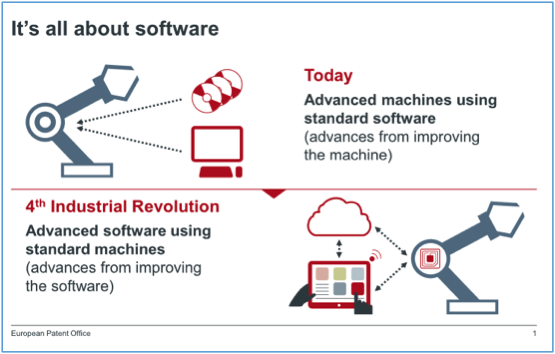 CII (computer implemented inventions) make up 49% of all registrations in the medical technology sector and over 60% in the automotive sector. The EPO sees software-driven inventions as the essential innovation path in practically all areas of technology and wants to act as a reliable partner for industry. The EPO has published various studies on the development of applications in the area of I4.0 technologies and a very recent study on the patent situation for autonomous driving.
CII (computer implemented inventions) make up 49% of all registrations in the medical technology sector and over 60% in the automotive sector. The EPO sees software-driven inventions as the essential innovation path in practically all areas of technology and wants to act as a reliable partner for industry. The EPO has published various studies on the development of applications in the area of I4.0 technologies and a very recent study on the patent situation for autonomous driving.
The first panel discussion was moderated by Mr. Roland Mayer, Head of IP Turbo, Head of Central Office IP Business Line Holdings / CoC Voith GmbG & KGaA, Heidenheim under the title: “How data, software, machine, value chain and business model can be protected via IP“. Panelists were Mr. Dr. Hans Kornmeier, Head of the Patent Department, Ifm electronic GmbH, Tettnang, Mr. Peter Möldner, Head of the Central Department of Intellectual Property Patents Mechanics, Robert Bosch GmbH, Stuttgart and Mr. Tillmann from Kuka AG, Augsburg on the key points:
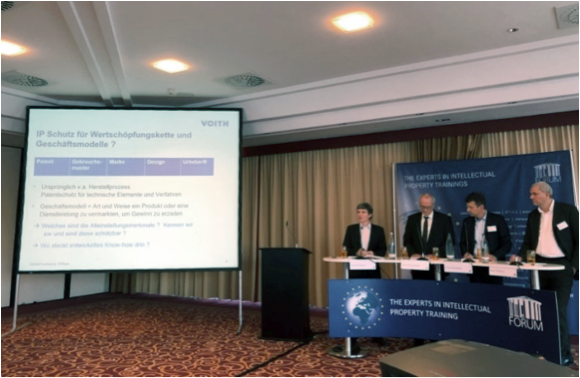
- IP toolbox and classic focus of intellectual property rights work
- Where does the information on inventions come from?
- Digital world: changed requirements for successful IP work?
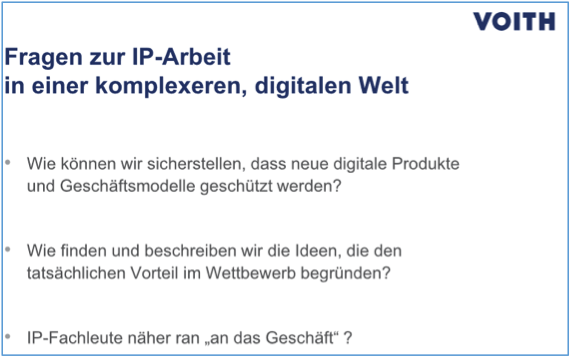 The result of the discussion was the conclusion that the patent department was in the “obligation to collect” to the growing number of stakeholders in IP management. In the case of digital topics, the classic role distribution of the patent department as the recipient and first instance of reviewing invention disclosures for patent suitability is no longer sensible and appropriate. Rather, the patent department must actively ensure that the sources of the inventions are aware of their creative and valuable work in terms of industrial property protection. The IP department needs tools which meet the requirements of the interdisciplinary nature of digital inventions. The IP department needs to be able to take the ideas above the threshold of the inventive step in the filing and it is increasingly becoming a co-inventor itself. The IP department is thus moving away from the “initial audit authority” towards an active co-creator of exclusivity positions in digital business models. To this end, it is increasingly necessary for IP experts to understand something about business models and customer benefits. Only with this understanding it can be clarified in individual cases what is worth protecting in a software concept. The focus is increasingly moving away from the products as such and towards the applications, but in these cases classic R&D is hardly the right contact. In digital business models it is also much less clear who the competition is and what exactly should be prohibited compared traditional product business. In this respect, IP experts also have to understand business strategies, potential cooperation partners and value creation networks much more intensively than before. This leads to a skills deficit or an increasing need for skills in the IP departments.
The result of the discussion was the conclusion that the patent department was in the “obligation to collect” to the growing number of stakeholders in IP management. In the case of digital topics, the classic role distribution of the patent department as the recipient and first instance of reviewing invention disclosures for patent suitability is no longer sensible and appropriate. Rather, the patent department must actively ensure that the sources of the inventions are aware of their creative and valuable work in terms of industrial property protection. The IP department needs tools which meet the requirements of the interdisciplinary nature of digital inventions. The IP department needs to be able to take the ideas above the threshold of the inventive step in the filing and it is increasingly becoming a co-inventor itself. The IP department is thus moving away from the “initial audit authority” towards an active co-creator of exclusivity positions in digital business models. To this end, it is increasingly necessary for IP experts to understand something about business models and customer benefits. Only with this understanding it can be clarified in individual cases what is worth protecting in a software concept. The focus is increasingly moving away from the products as such and towards the applications, but in these cases classic R&D is hardly the right contact. In digital business models it is also much less clear who the competition is and what exactly should be prohibited compared traditional product business. In this respect, IP experts also have to understand business strategies, potential cooperation partners and value creation networks much more intensively than before. This leads to a skills deficit or an increasing need for skills in the IP departments.
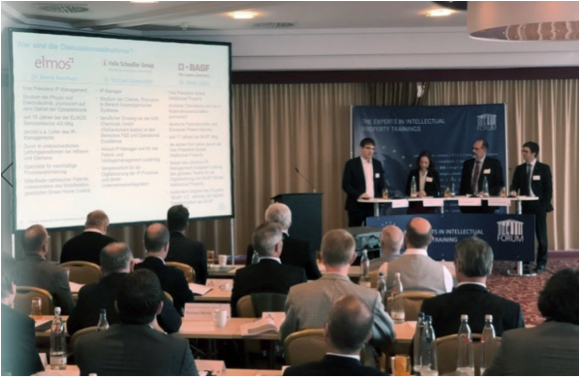
The second panel discussion was moderated by Dr. Jan Schulze, Head of IP Strategy / IP Research, ThyssenKrupp Intellectual Property GmbH, Essen, under the title “New competition through digitalization and IP”. Panelists were Dr. Bernd Burchard, Vice President IP Management, Elmos Semiconductor AG, Dortmund, Dr. Michael Kloskowski, IP Manager, Felix Schoeller Holding GmbH & Co. KG, Osnabrück, Dr. Alissa Zeller, Vice President Global Intellectual Property, BASF SE, Ludwigshafen, on the key points:
- Raising awareness for patenting digital business models in traditional industries
- Building up significant portfolios to create opposition against digitally driven market participants
- Risk assessment / FTO in the times of digitalization
The result of the discussion was the realization that digitalization in industry usually goes hand in hand with the development of new business fields and methods or processes and that this leads to a new competitive situation.
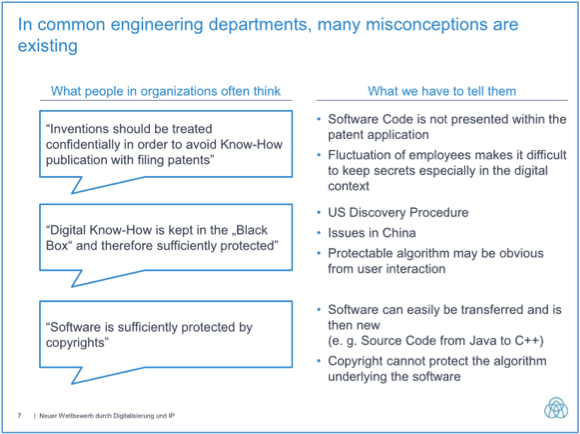
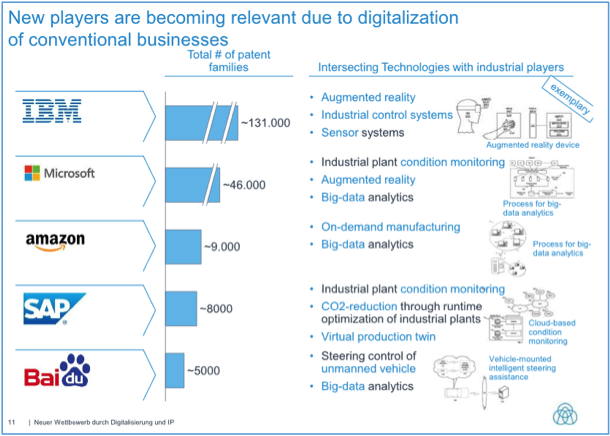
As Dr. Zeller from BASF explained a classic FTO with a definitive statement about the freedom to operate digital business activities makes less and less sense. Rather, it is important to design a risk-adjusted FTO process that remains active in high-risk business activities even after the activity has been launched. At BASF, the risks in such cases are expressed in monetary terms as a risk-adjusted share of the business’s EBIT. In this way, those responsible for the business can factor in the IP risk in the risk provision in the same way as other business risks such as competition, product development or the weather. In digital business models, IP is a decisive factor. Since otherwise no imitation barrier can be effectively built up, it is important to build an IP culture and IP awareness among the digital actors in the company. This can be achieved, for example, by aligning FTO analysis processes together with the company’s Chief Compliance Officer. For example, it should be avoided that offers are made to customers which are already part of third-party property rights. Dr. Zeller sees here a big advantage for German companies since asset-based data is available here. For example, Lufthansa suffers from the fact that digital travel portals are increasingly squeezing in the space between the company and the end customers. This access to the end customers is valuable and is exploited for monetary purposes, among other things. In fact, however, Lufthansa has unique asset-related data about its aircraft, for example when there are delays or cancellations that no other provider has and can thus develop unique solutions for customers. All companies that have experience in the physical world with tangible assets have such data and should think about the possible monetization of this data within the framework of business models that are as well protected as possible.
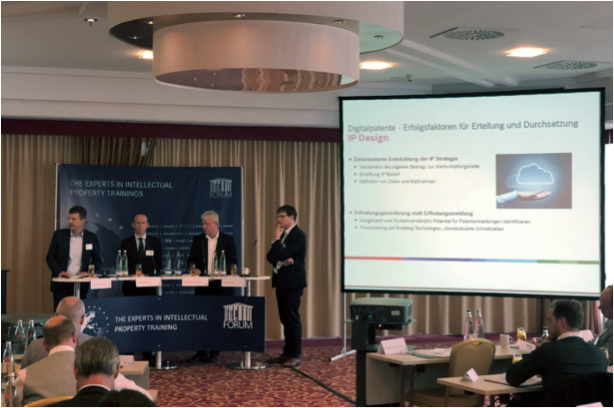
The third panel discussion was moderated by Mr. Peter Möldner, Head of the Central Department of Intellectual Property Patents Mechanics, Robert Bosch GmbH, Stuttgart under the title “Digital Patents – Success Factors for Granting and Enforcement”. Panelists were Mr. Christof Haust, Head of Intellectual Property Consulting, Heidelberger Druckmaschinen AG, Heidelberg, Dr. Dietmar Eickmeyer, AUDI AG, Neckarsulm, and Dr. Jan Schulze, Head of IP Strategy / IP Research, ThyssenKrupp Intellectual Property GmbH, Essen, on the key points:
- Formulation of claims with a perspective on patentability and technicality
- Limits of verifiability – what are the benefits of a patent?
- IP design – where to start?
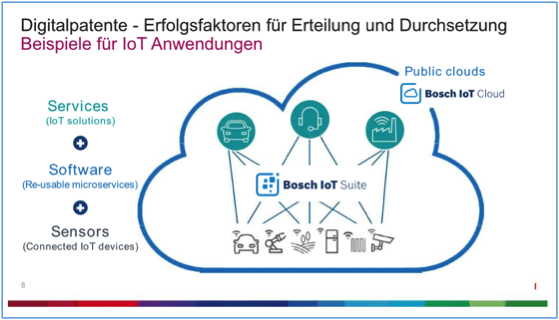 Mr. Peter Möldner from Bosch gave a detailed introduction to the challenge of systematically and purposefully obtaining and enforcing digital patents at international patent offices. He explained the “Bosch logic” of the intellectual triple jump “sens-think-act”, which means the sequence of sensor technology, digital data processing and subsequent machine control and / or regulation in order to achieve the success of the digital patent filing. The discussants agreed that the technicality requirement is no longer the decisive obstacle, especially at the EPO, but the inventive step, due to the recombinant nature of digital business models.
Mr. Peter Möldner from Bosch gave a detailed introduction to the challenge of systematically and purposefully obtaining and enforcing digital patents at international patent offices. He explained the “Bosch logic” of the intellectual triple jump “sens-think-act”, which means the sequence of sensor technology, digital data processing and subsequent machine control and / or regulation in order to achieve the success of the digital patent filing. The discussants agreed that the technicality requirement is no longer the decisive obstacle, especially at the EPO, but the inventive step, due to the recombinant nature of digital business models.
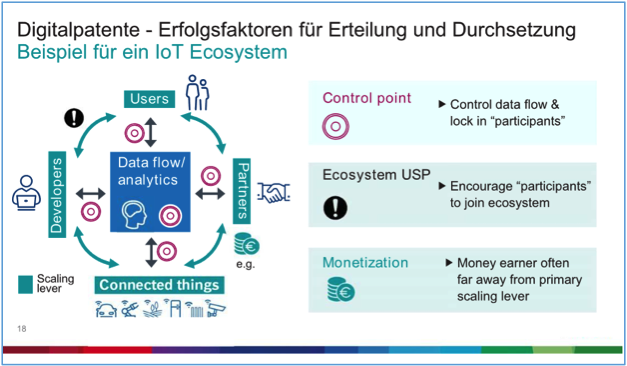 This also shows the different assessment practices of the DPMA compared to the EPO. In order to enable appropriate support for digital projects at Bosch, the approx. 85 patent counsels are assigned to approx. 10 groups with a digital expert who deals with digital technologies and business models and serves as a contact for the digital developers in the Group’s business units. The role of the organizational affiliation of the IP departments was discussed in detail. The organizational affiliation to the legal department was weighed against the affiliation to the technology department. It was agreed that a different error culture is necessary for digitalization and the associated agility and that trying out new and gaining experience also plays an important role. An affiliation to the fundamentally risk-averse legal department does not seem to make sense.
This also shows the different assessment practices of the DPMA compared to the EPO. In order to enable appropriate support for digital projects at Bosch, the approx. 85 patent counsels are assigned to approx. 10 groups with a digital expert who deals with digital technologies and business models and serves as a contact for the digital developers in the Group’s business units. The role of the organizational affiliation of the IP departments was discussed in detail. The organizational affiliation to the legal department was weighed against the affiliation to the technology department. It was agreed that a different error culture is necessary for digitalization and the associated agility and that trying out new and gaining experience also plays an important role. An affiliation to the fundamentally risk-averse legal department does not seem to make sense.
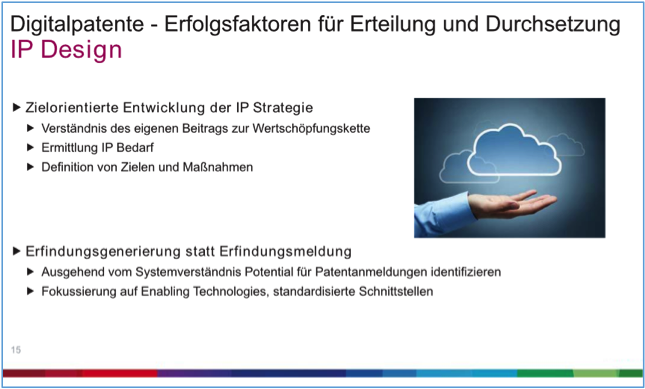
The concluding panel discussion was moderated by Prof. Dr. Alexander Wurzer. Panelists were Mr. Jürgen Grimm, Head of Software Solutions, Heidelberger Druckmaschinen AG, Heidelberg, Mr. Roland Mayer, Mr. Peter Möldner and Mr. Dr. Norbert Moritz, Head of IP Divisions “Digital Factory” and “Processes and Drives”, Siemens AG, Erlangen. They discussed as a summary the key aspects of this conference:
- IP protection for data, software, machine, value chain and business model
- Digitalization and IP – new competition
- Success factors for the issuing and enforcement of digital patents
This includes the idea of the new understanding of the role of IP in protecting digital business models. The IP department must actively shape the IP with the stakeholders, as part of the IP design processes.
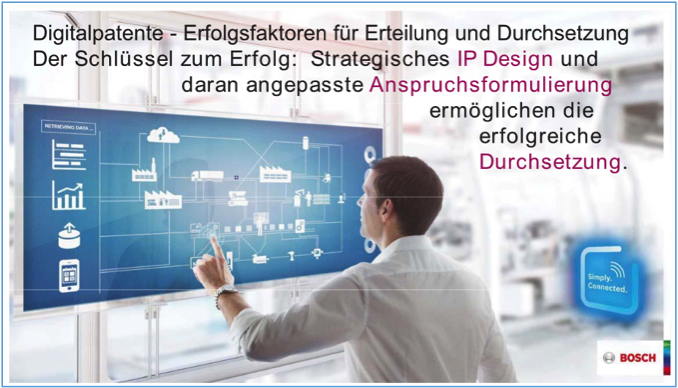
The development department is no longer the sole source of intellectual and creative achievements that need to be protected. The IP departments need the appropriate tools to integrate interdisciplinary input on business models, customer benefits and competitive strategies into their IP activities. The IP department is evolving more and more from a “testing authority” to an active and creative “co-designer” of IP. In order to use IP in digital business models to add value and to purposefully make business activities exclusive, companies need an IP culture that has to be established first, especially amongst digitally oriented employees – often against ideological resistance.
Conclusion of the event: Without IP, digital business models cannot be permanently monetized and the IP culture in companies from traditional industries has to change substantially. At the same time, we are facing a great opportunity for IP to make an important economic contribution and fundamental changes in the way IP actors see themselves.



